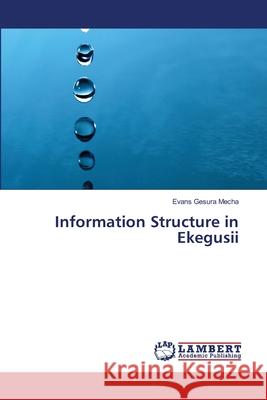Information Structure in Ekegusii » książka
Information Structure in Ekegusii
ISBN-13: 9783659188053 / Angielski / Miękka / 2014 / 380 str.
The work explores how the pragmatic functions, topic and focus, influence the formal organization and content of two discoursal components: word order, and referential coherence, based on Ekegusii, a Bantu language spoken in Kenya. It uses an eclectic approach in describing the role of information structure in Ekegusii. Lambrecht's model of Information Structure and Bidirectional Optimality Theory are used to capture both production and comprehension aspects in discourse. It demonstrates that information structural constraints at the sentential level mainly influence the information state of both canonical and non-canonical constructions word orders. Information structure influences the interpretation, through the pragmatic structuring of propositions, helping the hearer differentiate what is information (focus) in relation to a given topic, and this may induce movement, insertion or deletion of some sentential constituents. Information structure also interacts with referential coherence: alternative ways of coherently referring to participants using nominal expressions in the roles of grammatical subject object and oblique depend on pragmatic functions.
The work explores how the pragmatic functions, topic and focus, influence the formal organization and content of two discoursal components: word order, and referential coherence, based on Ekegusii, a Bantu language spoken in Kenya. It uses an eclectic approach in describing the role of information structure in Ekegusii. Lambrechts model of Information Structure and Bidirectional Optimality Theory are used to capture both production and comprehension aspects in discourse. It demonstrates that information structural constraints at the sentential level mainly influence the information state of both canonical and non-canonical constructions word orders. Information structure influences the interpretation, through the pragmatic structuring of propositions, helping the hearer differentiate what is information (focus) in relation to a given topic, and this may induce movement, insertion or deletion of some sentential constituents. Information structure also interacts with referential coherence: alternative ways of coherently referring to participants using nominal expressions in the roles of grammatical subject object and oblique depend on pragmatic functions.











